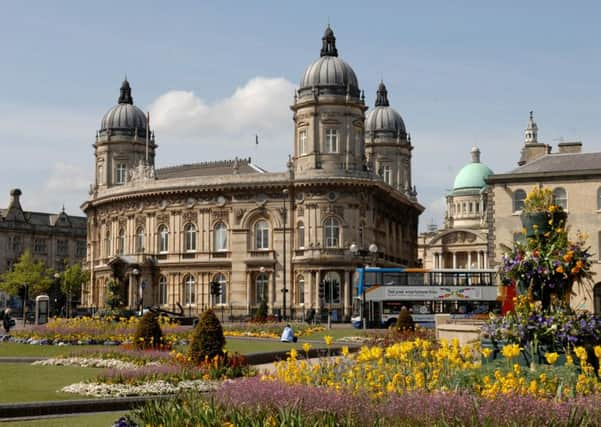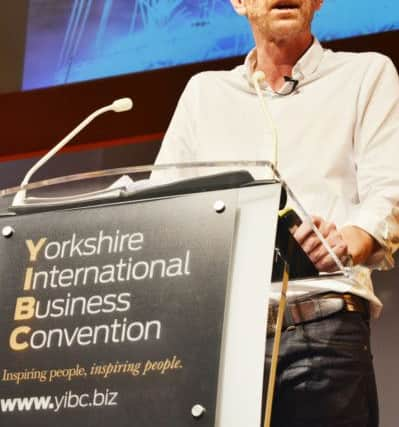City of Culture status will have lasting impact on the city and its people


For all the bold predictions about the economic impact of the city’s cultural status and the anticipated change in how Hull is perceived, both in East Yorkshire and beyond, the Chief Executive of Hull UK City of Culture 2017 feels the most enduring aspect of 12 months of celebration will be the opportunities it creates for local people.
Mr Green, who has previously worked on the massive success stories that were London 2012 and Yorkshire’s Grand Depart in 2013, is confident the unrelenting sense of pride that has seen the citizens of Hull through both thin and thin in recent decades will be a pivotal feature of City of Culture.
Advertisement
Hide AdAdvertisement
Hide Ad“Ten years after 2017, we will really see the lasting legacy of City of Culture,” he said. “We will see the impact of increased inward investment through skills, training and the creation of jobs.


“Hull should be established as a world-class visitor destination, with a strengthened economy to support the arts and culture. But perhaps the greatest lasting legacy of Hull 2017 for many people will be one of memory.
“Culture brings people together, encourages people to talk to each other, strengthens identity and increases confidence in a place. We’re finding Hull’s voice and starting conversations, with communities, with education providers, with business and with the wider world.
“We want people to look back on 2017 and feel proud to say ‘I was there’.”
Advertisement
Hide AdAdvertisement
Hide AdThe awarding of City of Culture status together with massive inward investment is already imbuing Hull with unprecedented levels of confidence and after decades of decline, there is well-founded hope that the planets are finally aligning in the city’s favour.
Reckitt Benckiser are spending £150m on a state-of-the-art research and development centre in the city; work has already started on the £310m Siemens site in January at Alexandra Dock that will become Europe’s largest wind turbine manufacturing plant, creating 1,000 new jobs; a new £200m Energy Works that will generate energy from household waste is underway; and the City Council has invested almost £100m in housing.
Mr Green said: “We want to position Hull as the cultural centre of the UK for the year. But this is a project that goes much deeper than culture and way beyond 2017.
“It is about changing lives; changing perceptions; changing the city’s economy; and changing the place for the long-haul.
Advertisement
Hide AdAdvertisement
Hide Ad“Culture is an economic case for jobs, investment, regeneration and tourism in a city that has for too long suffered with low employment rates and low aspirations.
“In Hull, perceptions are changing. Confidence in the city is strong. More than 50,000 people actively engage with us on social media. The infrastructure of the city is changing, with Hull City Council’s redevelopment of the city centre.
“Outside Hull, there is also renewed confidence in the city, evidenced by our local, national and international partnerships. There is serious inward investment in the city and at Hull 2017, we are building on this, by showcasing the city to attract more inward investment.”
Arts and industry have rarely worked as closely as they will in Hull in the coming years as the city prepares to play its full role in the new Northern Powerhouse as the region’s gateway to Europe.
Advertisement
Hide AdAdvertisement
Hide AdHull’s civic leaders are realistic about their expectations from City of Culture and the economic revival that has started in a city which has considerable to make up on the rest of the UK.
Hull remains the poorest city in in Britain across a range of measures - it has the lowest employment levels, more active job seekers than anywhere else and a very low rate of business start ups.
Council leader Coun Stephen Brady said: “Our aim over the next few years is to get up to the national average in terms of people in work.
“We want more jobs, more high quality jobs, more skills and more opportunities for our young people. To do that we are entering into exciting partnership with organisations like Hull University, our schools and the private sector.
Advertisement
Hide AdAdvertisement
Hide Ad“The Siemens plant is very important to us, both in terms of the jobs it creates directly and the impact it has on the city. I am sure we will see other big companies coming into Hull as a result of the work that’s taking place at Siemens.
“City of Culture is central to all that we do because it’s given the city a new sense of confidence that is inspiring long-lasting change. It’s bringing a sense of vibrancy to Hull that we’ve never had before.”
For Mark Jones, Hull Council’s Director of Regeneration, the legacy of City of Culture and the ongoing investment in Hull will be more tangible than vibrancy or memories.
“For me, the most important legacy will be when the first person from the Preston Road estate walks down through the Alexandra Dock to start work at the Siemens factory,” said Mr Jones. “Now that’s a success story for you.”